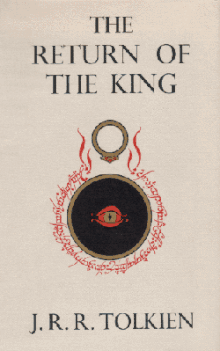The Return of the King
The Return of the King is the third and final volume of J. R. R. Tolkien's The Lord of the Rings, following The Fellowship of the Ring and The Two Towers. The story begins in the kingdom of Gondor, which is soon to be attacked by the Dark Lord Sauron.
 First edition | |
| Author | J. R. R. Tolkien |
|---|---|
| Country | United Kingdom |
| Language | English |
| Series | The Lord of the Rings |
| Genre | Fantasy |
| Set in | Middle-earth |
| Publisher | George Allen & Unwin[1] |
Publication date | 20 October 1955 |
| Pages | 416 (first edition) |
| OCLC | 933993 |
| 823.91 | |
| LC Class | PR6039.O32 L6 1954, v.3 |
| Preceded by | The Two Towers |
Title and publication
Tolkien conceived of The Lord of the Rings as a single volume comprising six "books" plus extensive appendices. The original publisher split the work into three volumes, publishing the fifth and sixth books with the appendices into the final volume with the title The Return of the King. Tolkien felt the chosen title revealed too much of the story, and indicated he preferred The War of the Ring as a title.[2]
The proposed title for Book V was The War of the Ring. Book VI was to be The End of the Third Age.[3] These titles were used in the Millennium edition.
The Return of the King was in the end published as the third and final volume of The Lord of the Rings, on 20 October 1955 in the UK.[4]
Contents
The volume contains a Synopsis for readers who have not read the earlier volumes. The body of the volume consists of Book V: The War of the Ring, and Book VI: The End of the Third Age. The volume ends with a set of Appendices and Indexes, varying in different editions.
Critical reception
The early book reviews, published in newspapers and journals in 1955 and 1956, are listed and summarised briefly, with a note on whether they are positive or negative, by George H. Thompson in Mythlore.[5]
In a review for The New York Times, W. H. Auden praised The Return of the King and found The Lord of the Rings a "masterpiece of the genre".[6]
Anthony Boucher praised the volume as "a masterly narration of tremendous and terrible climactic events", although he also noted that Tolkien's prose "seems sometimes to be protracted for its own sake".[7]
See also
References
- "The Return of the King". Between the Covers. Retrieved 28 December 2010.
- Carpenter, Humphrey, ed. (1981), The Letters of J. R. R. Tolkien, Boston: Houghton Mifflin, no. 140, ISBN 0-395-31555-7
- Carpenter, Humphrey, ed. (1981), The Letters of J. R. R. Tolkien, Boston: Houghton Mifflin, no. 136, ISBN 0-395-31555-7
- Tolkien in his letter of 12 October 1955 to Allen & Unwin, published in Carpenter, Humphrey, ed. (1981), The Letters of J. R. R. Tolkien, London, George Allen & Unwin, no. 172 (p.227)
- Thompson, George H. (1985). "Early Review of Books by J.R.R. Tolkien". Mythlore. 12 (1 (43) Autumn 1985): 58–63. JSTOR 26810708.
- Auden, W. H. (22 January 1956). "At the end of the Quest, Victory". The New York Times.
- "Recommended Reading", F&SF, July 1956, p.92.
External links
| Wikiquote has quotations related to: The Return of the King |
- The Return of the King at the Internet Book List
.jpg)